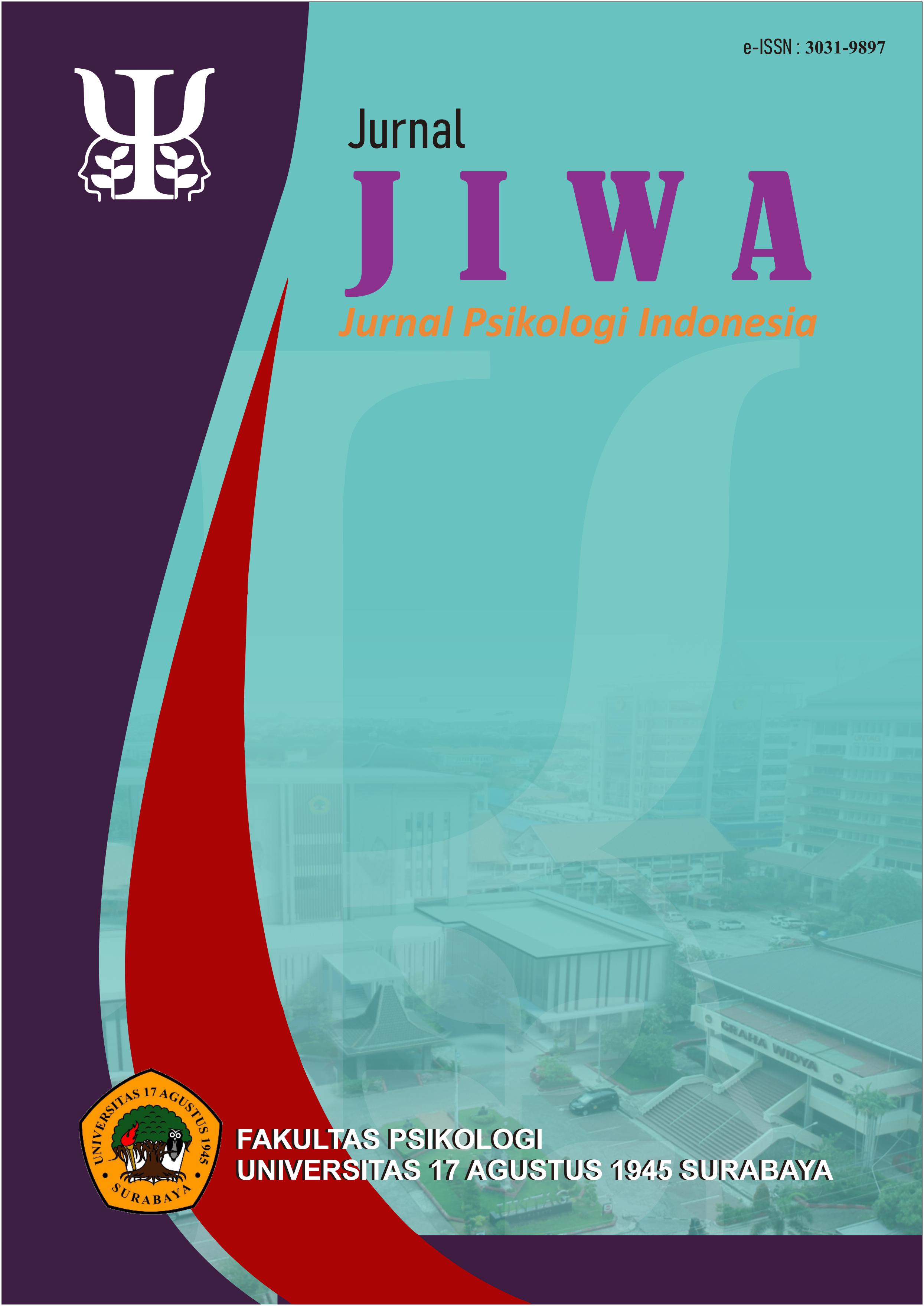Subjective Well-Being pada Pasangan Suami Istri TNI-AL : Bagaimana Peran Psychological Capital dalam Menjalankan Long Distance Marriage?
DOI:
https://doi.org/10.30996/jiwa.v2i2.10529Keywords:
Psychological Capital, Subjective well-being, Long Distance Marriage, Pasangan suami-istri, TNI-ALAbstract
Abstract
Subjective well-being behavior is influenced by positive factors, negative factors, and life satisfaction which leads to aspects of cognitive assessment of the whole of life. The purpose of this study was to determine the relationship between psychological capital and subjective well-being in Indonesian Navy married couples who undergo long distance marriage due to duty. This research method is a quantitative method with purposive sampling technique. The population of this study is a married couple of TNI-AL who are or have undergone long distance marriage with an infinite population. Participants taken to research a total of 97 people. The data analysis technique uses non-parametric with spearman's rho method. The results of data analysis in this study are psychological capital has a significant positive relationship with subjective well-being so that the hypothesis is accepted. The higher the psychological capital, the higher the subjective well-being. Vice versa, if psychological capital is low, subjective well-being in married couples is also low.
Abstrak
Perilaku subjective well-being dipengaruhi oleh faktor positif, faktor negative, dan kepuasan hidup yang mengarah pada aspek penilaian kognitif tentang keseluruhan dari kehidupan. Tujuan penelitian ini adalah untuk mengetahui hubungan antara psychological capital dengan subjective well-being pada pasangan suami istri TNI-AL yang menjalani long distance marriage karena bertugas. Metode penelitian ini adalah kuantitatif dengan Teknik Purposive Sampling. Populasi penelitian ini pasangan suami istri TNI-AL yang sedang atau pernah menjalani long distance marriage dengan populasi infinit. Partisipan yang diambil untuk meneliti sejumlah 97 orang. Teknik analisis data menggunakan non-parametrik dengan metode spearman’s rho. Hasil analisis data pada penelitian ini adalah psychological capital memiliki hubungan positif yang signifikan dengan subjective well-being sehingga hipotesis diterima. Semakin tinggi psychological capital maka subjective well-being yang didapat juga tinggi. Begitupun jika psychological capital rendah maka subjective well-being pada pasangan suami istri juga rendah.
Downloads
References
Diener, E., & Chan, M. Y. (2011). Happy People Live Longer: Subjective Well-Being Contributes to Health and Longevity. Applied Psychology: Health and Well-Being, 3(1), 1–43. https://doi.org/10.1111/j.1758-0854.2010.01045.x
Diener, E., Oishi, S., & Tay, L. (2018). Advances in subjective well-being research. Nature Human Behaviour, 2(4), 253–260. https://doi.org/10.1038/s41562-018-0307-6
Diener, E., Suh, E. M., Lucas, R. E., & Smith, H. L. (1999). Subjective Weil-Being: Three Decades of Progress. In Psychological Bulletin (Vol. 125, Issue 2).
Kurniady, D., Karneli, Y., Studi, P. S., & dan Konseling, B. (2023). Problem Solving untuk Meningkatkan Subjective Well-Being Hubungan Pernikahan Domisili Jarak Jauh. In Jurnal Ilmu Pendidikan dan Sosial (JIPSI) (Vol. 1, Issue 4).
Leffert, M. (2017). Positive Psychoanalysis.
Luthans, F., Avey, J. B., Avolio, B. J., & Peterson, S. J. (2010). The development and resulting performance impact of positive psychological capital. Human Resource Development Quarterly, 21(1), 41–67. https://doi.org/10.1002/hrdq.20034
Luthans, F., Avolio, B. J., Avey, J. B., & Norman, S. M. (2007). Positive psychological capital: Measurement and relationship with performance and satisfaction. In Personnel Psychology (Vol. 60, Issue 3, pp. 541–572). https://doi.org/10.1111/j.1744-6570.2007.00083.x
Maddux, J. E., & Routledge. (2018). Subjective Well-being and Life Satisfaction. www.routledge.com/
Sarjana Sosial Dalam Bidang Ilmu Bimbingan dan Konseling islam, G., Bimbingan Dan Konseling Islam Jurusan Dakwah Fakultas Ushuluddin, P., & Dan Dakwah, A. (2021). KONDISI PSIKOLOGIS ISTRI TNI SAAT DITINGGAL SUAMI BERTUGAS ( Kompi B Yonif 144 Jaya Yudha Kota Bengkulu ) SKRIPSI Diajukan Sebagai Syarat Guna Memperoleh. https://www.repository.iainbengkulu.ac.id
Sugiyono, D. (2013). Metode penelitian pendidikan pendekatan kuantitatif, kualitatif dan R&D.
Sugiyono (2015). Metode Penelitian Kombinasi (Mix Methods). Bandung: Alfabeta
Tovan, T., & Rauf, R. (2020). PENGARUH SUBJECTIVE WELL-BEING DAN PSYCHOLOGICAL CAPITAL TERHADAP KINERJA PEGAWAI PEMERINTAH DAERAH KABUPATEN MOROWALI (Vol. 6, Issue 1). https://journal.stieamkop.ac.id/index.php/mirai
Youssef-Morgan, C. M., & Luthans, F. (2015). Psychological capital and well-being. In Stress and Health (Vol. 31, Issue 3, pp. 180–188). John Wiley and Sons Ltd. https://doi.org/10.1002/smi.2623
Yusni, H. S., Fikry, Z., Psikologi, J., Psikologi, F., Kesehatan, D., & Padang, U. N. (n.d.). Hubungan Self Efficacy dan Subjective Well Being pada Remaja Yang Berhubungan Jarak Jauh dengan Pasangan.







